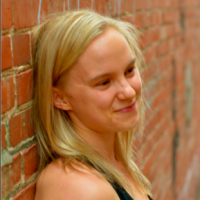In California, detoxes are all the rage. I should know — I just moved to the sunny city of Santa Monica, California a few weeks ago — and it’s been a bit of a culture shock to say the least. It seems like everyone I meet is on a five-day juice fast, and I’ve never met so many kale-loving freaks in my life (mind you, I now count myself one of them).
As a woman with a long history of food and body issues, I usually try to keep as far away from anything labeled “detox” or “cleanse” as possible. I find it difficult to separate concepts like “detoxification” and “diet” in my mind, and I often wonder if all the zeal about juicing and raw food diets in the yoga community is a sort of collective eating disorder dressed in pseudospiritual clothing. It took me years of therapy and cognitive re-training to finally release beliefs like “my body needs to be fixed,” and frankly anytime I find myself immersed in all the fear-mongering about toxins and pollutants ravaging our systems from the inside… it brings all the old crap (pun intended) to the surface.
So when the first thing out of Seane Corn’s mouth at her Detox Flow intensive Friday morning was, “A detox is not a diet,” I felt myself breathe a sigh of relief.
Often, when we talk about detoxes in our society, what we are actually referring to are very radicalized individual health regimens. It’s the five-day juice cleanse, the wheat grass enemas (yes, you heard me right), or maybe if you’re lucky you’ll actually get to chew your food with a weeklong kitchari diet. For many of us, our desire to detox emerges from a deeper-seated belief that we don’t talk about so often… the notion that we are dirty, contaminated, not okay as we are. If we’re not careful, we can become so obsessed with clearing the toxins (that realistically do exist) from our bodies that programs designed to instill more health and well-being actually become more abusive than the toxic lifestyle we are trying to remedy to begin with.
With all these reservations, you might find it surprising that the first class on my schedule for Yoga Journal’s San Francisco Conference was a six-hour intensive about detoxing. The truth is, as off-putting as I find our cultural obsession with cleansing, I also feel inexplicably drawn to it. There’s a part of me that still feels like, “Well, if I could just eliminate that desire I have for sweet foods…. maybe then I would feel more happy, more vibrant, more nourished by my life.”
Photo Credit: Cleveland Groove
But here’s the thing… Seane’s version of detoxification is not your typical let’s-sweat-until-you-smell-like-what-you-ate-last-night kind of class. By the time we made it to the first twist, what I felt seeping from my pores was not the grease from last night’s dinner: it was tightly-wound tendrils of pent-up frustration buried deep inside my muscles. “The biggest cause of dis-ease in our society,” Seane said, “is our lack of self-care, lack of self-worth. If we want to alter the state of the world, we have to start with a revolution within.”
And this, I suppose, is why I find myself coming back to these classes over and over again. “On a deeper level,” Seane reminded Friday’s class, “this is about much more than the health/wellness we create in our individual bodies. This is about how we’re treating our planet on a collective level.”
One of the things I appreciated most about this approach to detoxing was the fact that it really did embrace a holistic perspective. Sure, we talked about how processed foods affect the digestive system and how unexpressed emotion can reek havoc on the adrenal glands. But the conversation also shifted to the macro-level — to the truly abominable food being shelled out in elementary school cafeterias across the country and how government subsidies for agribusiness make healthy, organic options inaccessible to lower-income families.
My big take away from the class? It’s all about the balance, baby. For me, it’s much more comfortable to talk about the need for detoxification at a collective level… Let’s boycott Tyson! Create alternative fuel services! Get the gunk out of our food! What’s more difficult for me to sit with is the discussion that Seane stuck with for most of the class — the idea that our relationship to food is most often a poignant reflection of our relationship to ourselves. If you find yourself gorging on sweets every time you visit your mother, perhaps it’s worth looking at what gaping hole you’re actually trying to fill. And if you want to enact any type of meaningful, long-standing change on a collective level… well, you’re not going to get anywhere if you’re not taking care of yourself.
I know I wasn’t the only one in that room who had struggled with food/body issues (who hasn’t, right?), and I can only imagine how many readers of this blog have walked a similar path. So, how about it? What’s been your experience with detoxes and cleanses? How do you ensure that your detox isn’t just another self-deprecating diet in disguise?











Read 3 comments and reply